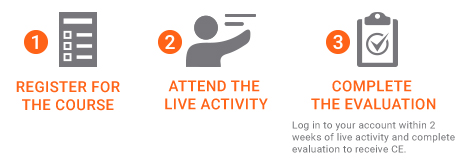Aventura, FL – October 1-2, 2016
This practice-based activity will allow participants to apply sets of rules, utilize developmental tools, and be provided with constructive feedback through assessment tools for seven key components of business practices: 1) business development, 2) financial management, 3) operations, 4) marketing, 5) regulatory compliance, 6) education, and 7) collaborative practice modeling. These business components are assessed across five stages in the life cycle of a compounding practice: 1) the new marketplace, 2) first year of practice, 3) growth plateau, 4) new niche market, and 5) succession planning. This activity will provide participants with the means to further growth, or better position a compounding practice in the marketplace.
Participants will assess their competency across seven components of business by completing a Personal Business Ready Profiler at the start of the activity, upon completion of each of the seven components of business practices, and at the close of the activity. This self-assessment tool helps the participant to understand whether they are business prospectors, expanders, developers, or entrepreneurs, allowing for further personal and professional development.
The business development component of this activity includes the creation and assessment of mission and vision statements, roles and responsibilities, risks and rewards, and SWOT analyses, all of which set the stage for the establishment of short- and long-term goals for a compounding practice, during any stage of its evolution.
The operations component evaluates and forecasts marketing requirements, resources, and financials against the day-to-day operations of a compounding practice. Financial ratios are now qualitatively expressed in relation to designated time points along an operational timeline where the participant establishes cornerstones and milestones. Operations, merged with the investment requirements and forecasted revenues of a compounding practice, ensure the strategies undertaken maintain the business’s integrity from the perspective of nine financial ratios.
The marketing component is divided into four subsections: corporate branding, sales, communication, and relationship building. Corporate branding will be addressed from the perspectives of brand management and recognition, customer relations, market research, financial metrics and return on investment, public relations, social media, advertising, graphic design, content development, sales, and pricing unique to a compounding pharmacy practice. Participants will then create marketing material, incorporating rules and applying strategies provided during the seminar and applying an assessment tool to evaluate the impact and effectiveness of their marketing material concepts. Additional modes of communication are evaluated and assessed for their efficiency and efficacy with respect to a compounding pharmacy practice.
The regulatory compliance component brings together business, contracts, and many other laws and regulations. Specific regulations are addressed, providing the participant with dos and don’ts in relation to the Drug Quality and Security Act, the Anti-Kickback statute, advertising restrictions, DEA rules and regulations, marketer (employee) standard operating procedure guidelines, out-of-state marketing and sales, office use compounding, the Stark Law, state-specific rules and regulations, insurance rules and regulations, telemedicine, and HIPAA HITECH compliance. Changes to standards of practice, such as USP Chapter <800>, are also addressed.
The educational component assists the compounding pharmacist in establishing a short- and long-term strategic plan for theoretical and practical training, as well as a competency assessment plan for themselves and all other personnel.
Finally, the collaborative component establishes a strategy for the development of co-traveler, collaborative practice relationship building in support of communication and sales initiatives. From the establishment of a value proposition to more formal collaborative strategies, the ability to sell an idea, a concept, and oneself are important factors leading to the success of a compounding practice.
As the activity begins, a culture is created the moment the participant walks through the door. Participants can be assessed, at any time, for their potential as prospective business partners. Relationships will be forged based on one’s business savvy and teams will be constructed. Each team will embark on a dynamic process of establishing a strategy to purchase one of a number of existing compounding pharmacies for sale. These existing practices are in variable states of disrepair and require careful analysis. Participants will utilise the skills and tools they acquired and place them into an investment proposal booklet. Participants will verbally present arguments to secure funds from financial investors. Participants not presenting will assess risk and reward potentials for each of the components of business being presented and how they relate to any and all of the other business components. The team seeking the investment is given the opportunity to defend themselves against criticism from their colleagues. This last activity is itself a competency assessment and a tribute to the importance of the integration of the seven components of business development.
Intended audience
Learning Objectives
FOR PHARMACISTS:
- Construct a business plan for a new or existing compounding practice incorporating seven key components of business practices: business development, financial management, operations and logistics, marketing and sales, regulatory compliance, educational practices and collaborative practice modeling.
- Compose a mission vision statement, specific roles and responsibilities of personnel, risk and reward assessments, a SWOT analysis, and short- and long-term objectives for a new or existing compounding practice at any of the five critical stages in the life cycle of a practice (new to the marketplace, critical first year, growth plateau, expansion into new niche markets, and succession planning).
- Appraise a compounding practice’s financial statement (income and balance sheet statements) through the use of the DuPont Return on Investment Model and nine ratios: the acid test, times interest earned, net profit margin, current ratio, equity multiplier, inventory turnover, receivables turnover, return on assets, and return on equity.
- Predict and forecast operational and logistical needs of a compounding practice pertaining to marketing, resources (technological and chemical), financial, educational, and collaborative requirements.
- Create a brand for a compounding pharmacy practice through the coordinated development of the graphic design and marketing material content of advertising and promotional campaigns, leading to a uniform and consistent corporate message by any and all modes of communication.
- Develop a pricing scheme for compounded preparations, having taken into consideration perceived quality, perceived value, expertise, time, labor, market demand, assessment of profit margins, market driven pricing, commercial benchmarks, insurance policies, preparatory and/or clinical risk.
- Design unique marketing material that can be used to advertise and promote a compounding practice.
- Prepare marketing action plans through an array of modes of delivery of a marketing message: Internet marketing, co-traveler piggybacking, community event planning, loyalty programs, hard copy material distribution, and live event communication and sales.
- Judge the importance of, and regulatory compliance requirements related to, corporate, business, contract, advertising, intellectual property, financial and taxation, labor, employment, and health and safety laws and regulations.
- Argue critical aspects of the Drug Quality and Security Act, the Anti-Kickback statute, advertising restrictions, DEA rules and regulations, out-of-state marketing and sales, office use compounding, the Stark Law, state-specific rules and regulations, insurance rules and regulations, telemedicine, and HIPAA HITECH.
- Compose policy as it applies to marketing and sales personnel and the information they transmit/communicate to your audience.
- Create a marketing plan by assessing market potential, analyzing customer needs, fostering a competitive edge, sharpening sales and marketing skills, and developing marketing tools.
- Organize co-traveler collaborative partnerships, leading to a more profitable means of communication and relationship building, for the purpose of networking to spread your marketing message.
- Compose a business proposal leading to the acquisition of venture capital, incorporating all seven components of business development.
- Construct a detailed short- and long-term timeline associated with a business proposal leading to the acquisition of venture capital, incorporating all seven components of business development.
An unrestricted educational grant has been provided by MEDISCA Inc.
The preferred hotel accommodation is the Residence Inn by Marriott Miami Aventura Mall
For reservations, please call 1-786-528-1001 or click here.

Based on availability. Payment for hotel accommodations is at the expense of the activity participant.

MARK FILOSI, BS Pharm, RPh
Compounding Pharmacist and Co-Founder, Family Care Pharmacy
Disclosure: Accreditation Commission for Health Care Surveyor; MEDISCA Consultant
Mr. Filosi is a compounding pharmacist for a thriving non-sterile and sterile practice with over 20 years of experience. He is also a surveyor for the Pharmacy Compounding Accreditation Board (PCAB), a service of the Accreditation Commission for Health Care (ACHC). Additionally, Mr. Filosi is the owner of Family Care Pharmacy in Plant City, Florida, where he is responsible for the sales and marketing of the compounding segment of his business. His compounding practice ranges from non-sterile hormone preparations to high-risk intrathecal preparations.
He graduated cum laude from Fitchburg State College in Fitchburg, Massachusetts, and then went on to graduate cum laude in Pharmacy from Massachusetts College of Pharmacy in Boston, Massachusetts. Today, Mr. Filosi is a preceptor for Florida A & M University, University of Florida and Massachusetts College of Pharmacy.
CPE Credits: 16 CPE Hours = 1.6 CEUs
Joint Accreditation Status (University of Florida College of Pharmacy / LP3 Network)
Activity type: Practice-based
UAN: 0012-9999-16-003-L04-P
To receive CPE credits for the live component, participants must demonstrate full and satisfactory participation, and submit a completed evaluation to the University of Florida College of Pharmacy.
Participants registered in the United States can obtain a statement of credit from their NABP e-profile. The University of Florida College of Pharmacy will report CPE credits to the CPE Monitor. Participants registered other than in the United States will receive a statement of credit by mail.

International participants should verify with their respective governing board for accreditation equivalency.
Price
A written request must be sent to LP3 Network requesting “Cancellation without Transfer” to an alternate live activity date. If cancellation occurs at greater than or equal to 31 days from the live activity date, then the registrant will receive a 75% refund; 15-30 days a 50% refund; and less than or equal to 14 days no refund.
TRANSFER POLICY:
The transfer policy is only in effect if requested greater than or equal to 14 days prior to the original live activity date. Failure to submit the “Transfer Request” at least 14 days prior to the original live activity date will default to the “Cancellation and Refund Policy”. The transfer policy can only be applied one (1) time. Transfer to a new live activity date must be within the current calendar year. Failure to attend the new live activity will result in no refund and will no longer be transferable. Confirmation of the new activity date is subject to approval by LP3 Network based on the number of available seats within the selected live activity. There are no refunds, returns, or transfers upon purchase of the home study.
CURRENT PROMOTION:
20% Off
 Use coupon code 20LP316 upon checkout to receive 20% off this educational training.
Use coupon code 20LP316 upon checkout to receive 20% off this educational training.
PURCHASE INFORMATION:
Don’t see the Add to Cart button? Please try to Log In, Create an Account or Contact Us for help!

 Facebook
Facebook X
X LinkedIn
LinkedIn Forward
Forward
